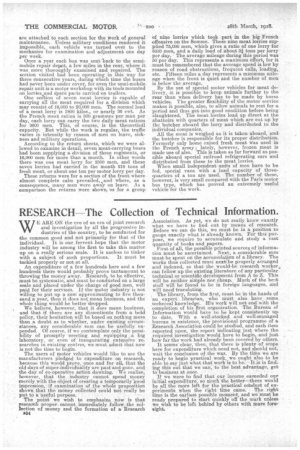RESEARCH—The Collection of Technical Information.
Page 12

If you've noticed an error in this article please click here to report it so we can fix it.
WE ARE ON the eve of an era of joint research and investigation by all the progressive industries of the country, to be conducted for the common good and not primarily for that of the individual. It is our. fervent hope that the motor industry will be among the first to take this matter up on a really serious scale. It is useless to tinker with a subject of such proportions. It must be tackled properly or not at all.
An expenditure of a few hundreds here and a few hundreds there would probably prove tantamount to throwing the money away. Research, to be effective, must be systematic, and must be conducted on a large scale and placed under the charge of good men, well paid for their services. If the motor industry is not willing to put up a sum approximating to five thousand a year, then it does not mean business, and the whole thing would be better dropped. We believe, however, that it does mean business, and that if there are any dissentients from a, bold policy, their hesitation will be based on nothing more than .a doubt as to whether, under existing circumstances, any considerable sum can be usefully expended. Of course, if we contemplate only the possibility of promptly -erecting and equipping a big laboratory, or even of inaugurating extensive researches in existing centres, we must admit that now
is not the time to begin. .
The users of motor vehicles would like to see the manufacturers pledged to expenditure on research, because this would prove, once and for all, that the old days of super-individuality are past-and gone, and the day of co-operative action dawning. We realise, however, that the industry cannot spend money merely with the abject of creating a temporarily good impression,if examination of the whole proposition shows that the money collected could not really be put to a useful purpose.
The point we wish to emphasize new is that researeh -proper cannot immediately follow the collection of money and the formation of a Research 334 , Association. As yet, we do not really know exactly what we have to find out by means of research. Before we can do this, we must be in a position to gauge exactly what is already known. For this purpose we require to accumulate and study a vast quantity of books and papers. First of all, the possible printed sources of information must be ascertained. Next, a considerable sum must be spent on the accumulaeion of a library. The works thus collected must nextlae properly arranged and indexed, so that the would-be research worker. can follow up the existing literature of any particular technical or scientific development from A to Z. This will be neither sirriple nor cheap. Much of the beet stuff will be found to be in foreign languages, and will need translating.
The library, from the first, must be in the hands a an expert librarian, who must also have some technical knowledge. His work will not end with the completion of his first. organization. The Bureau of Information would have to be kept consistently up to date. With a well-stocked and well-managed bureau in existence, the provisional programme of a Research Association could be studied, and each item reported Upon, the report indicating just where the required investigation-would have to begin, and just how far the work had already been covered by others.
It seems clear, then, that there is plenty of scope here for expenditure which need not, and should not, wait the conclusion of the war. By the time we are ready to begin practical work,. we ought also to be able to say just what that work is to be. It is in finding this out that we can, to the .best advantage, get
to business at once. • . •
If we were to find that our income. exceeded our initial expenditure, so much thebetter—there would be all the more left for the practicalco'n.duct of experiments, when the right time came. The _right time is the earliest possible moment and 'we inust be ready. prepared to start quickly off the mark Unless we wish to be left behind by others with more foresight.






















